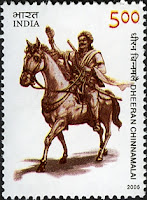VSK TN
DHEERAN CHINNAMALAI – A WARRIOR WHOM THE BRITISHERS FEARED MUCH (1756 – 1805)

Kongunadu (the areas covering Erode, Coimbatore, Nilgiris, and parts of Dharmapuri district in TN) like Pandiyanadu is another place where many unsung heroes fought valiantly against the British rule in the second Polygar war of 1802 to 1804. Theerthagiri (born in 1756) in Kangeyam (near Erode) as the second son of Rathinasamy Mandradiar, the local chieftain there, was an able administrator, a first class warrior and a horseman. Most importantly, he was such an inclusive leader, he could take people of all castes Along with him. He defended his region against the incursions of Mysore army of Hyder Ali and later his son Tippu Sultan who had captured all nearby areas, and refused to acknowledge them.
Hearing that the Sultan’s people were threatening and collecting taxes from local farmers, he crossed the Mysore Diwan and his army near Chennimalai and Sivanmalai areas, fought and recovered all taxes collected by the Diwan from nearby areas and told the Diwan – “Go and tell your Sultan, that people of Kongunadu can manage and rule themselves and don’t need Mysore to rule us.” The astonished Diwan asked Theerthagiri who he was and he laughed and said “Tell him I am the “small mountain” (Chinna malai) between Chennimalai and Sivanmalai (both names of real mountains).” From then on, he was known as Dheeran Chinnamalai or Chinnamalai, “the courageous”.
When the British army under Gen. Harris attacked Mysore, Tippu Sultan invited Chinnamalai to fight alongside Mysore, and considering the national interests to fight a foreign enemy, Chinnamalai agreed despite their own long-term rivalry and went with a 10000 strong army from Kongunadu to fight the British with Sultan. When the Sultan was treacherously killed in the battle and British took Mysore, he and his fellows returned. One of his close aides named Velappan was however caught by the British and he turned approver and agreed to serve General Harris.
The British then took all the areas under Mysore upto Dharmapuri district in TN that were earlier under Sultan and started to negotiate with Kongunadu too. Chinnamalai however refused to accept their offer to keep a cavalry base at Cauvery banks, or to pay taxes inspite of the British offer to allow him to rule his kingdom. Upset by the spurn off, the British sent a battalion led by Col Makiskan on the banks of Cauvery river. The shrewd Chinnamalai who knew his terrain very well, had planted his own horses in the river at very strategic places where there were whirlpools and without knowing this, the British army entered the river and were caught unawares. He defeated them in the ensuing battle and beheaded Col Makiskan.
Annoyed by this, Gen Harris himself came with another army, well planned on a day of festival in the nearby temple, so that most people won’t be prepared to counter-attack there. But he could not find Chinnamalai there. He and his army damaged the whole temple and tried visiting his vacant fort in Odanilai. To his surprise, Harris found Dheeran coming alone in a horse facing him and he hurled a grenade towards the General and in the milieu the General lost control of his horse and again had to retreat. General Harris concluded that Chinnamalai could not be defeated at all, as even as a single person he could make the British retreat.
Gen Harris then ordered cannons and came back and destroyed Chinnamalai’s fort in Odanilai and when he entered there, again he could not find Chinnamalai and for that matter not even a single person inside the fort. The angry General just found a pair of sandals and he took one of the sandals and threw it on the wall in despair. The sandal broke into two and he found a small bit of message written inside. Intrigued he took it and found out that it was a tip off to Chinnamalai a week or so earlier that the General was planning to attack with cannons eight days later.
The General then ordered to find who was behind this and he caught hold of the shoemaker who made these special sandals and shoes. He found out that, it was Velappan who had turned approver in Mysore and was serving British, who was still loyal to Chinnamalai and sending these tip offs well in advance. They immediately shot Velappan and ordered a local cook called Nallaan, who was a traitor, to catch Chinnamalai who by that time was already living in forests and fighting guerrilla warfare. The unsuspecting Chinnamalai and his brother came to the cook’s house at night to have dinner, and the cook convinced them to leave the arms outside and have the dinner peacefully inside. While they were having dinner unarmed, he opened the rear door of his house and the British army entered and captured Chinnamalai and his brother.
Even at that hour, the brave Chinnamalai with one hand caught hold of the cook’s neck and strangulated him and the cook died on the spot. Chinnamalai and his brother and other men were hanged in Sankagiri on 31 July 1805. The angered British destroyed and burnt everything that was associated with him hence, no actual historical accounts of Chinnamalai are available unfortunately. Most of the stories were told as simply folklore by the villagers and specially Pulavar Kuzhandai a scholar from that region had heard it from his grand dad and he was the one to give the narrative much later in the early twentieth century.
